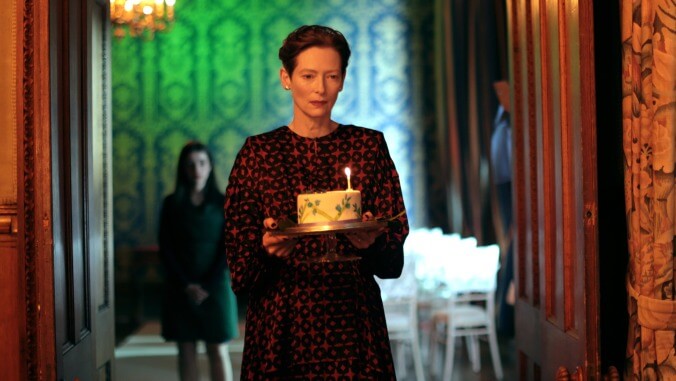The Eternal Daughter review: Tilda Swinton stars opposite, well, Tilda Swinton
Director Joanna Hogg gets her star to pull double duty in a haunting, atmospheric mystery

Writer-director Joanna Hogg opens her new film The Eternal Daughter with the screen awash in a misty fog. It’s dusk, obviously cold, and the disquieting music on the soundtrack adds to the eerie atmosphere. An old, gothic building appears in the distance, tricking the audience into thinking this is a story from the past. Then her main characters appear; a mother and daughter pair speaking in Scottish accents and looking exhausted inside a rickety old taxi. The mood has been established. This must be a ghost story, one that lingers and haunts. It turns out we’re not too far off: it’s a memory story. And those can haunt too.
The mother and daughter are visiting an old family home that’s been turned into a hotel. The strangeness of the setting is exacerbated by the hotel seemingly having no other guests. As they deal with a late check-in and fuss about their particular requests—a certain room and an unavailable late-night meal—who they are and what they are doing begins to emerge. The daughter—a stand-in for Hogg herself—is a filmmaker in the midst of writing her latest film and the mother is celebrating a birthday. They both hope this place, which holds many memories for the older woman, will unlock something in them—perhaps bringing them closer or creating new memories to cherish as time together slips by.
That both characters are played by Tilda Swinton (reuniting the star with Hogg after The Souvenir and its sequel) only adds to the disturbing but intimate atmosphere of this story. We are never quite sure exactly what’s happening in The Eternal Daughter. Cloudy hazes hover over every scene, even those set in the bright morning. We only catch glimpses of the conversations between these two main characters. And when others briefly appear, it’s never clear whether they really exist or if they are being hallucinated by one of the two Swintons. Hogg is able to effectively conjure memory; her film is as elusive as our memories can be.
Her ability to weave cataclysmic emotions from small incidents, like a dog going missing, is remarkable. At the heart of The Eternal Daughter are parental relationships; both the perfect version we all aspire to and the actual ones full of misunderstandings and passive-aggressive jibes. But what separates this film from other recent memory pieces of cinema is the delicate handling of what both parents and children want from each other. Setting it as a ghostly, dreamlike story, Hogg is able to reveal truths while also showing the aspirational ideal of such relationships.
Both mother and daughter are anxious about what the other thinks, yet can’t talk about it except to strangers. And like many ghost stories, Hogg introduces a groundskeeper to solve this conundrum. But his presence this time is not to scare anyone, but rather to act as the conduit who coaxes confessions that can never be told to anyone else. Played with empathetic ease by Joseph Mydell, this stranger is the only person mother and daughter can tell how wonderful they think the other is. He has his own story, of course. When he talks about how his memories of his dead wife envelop him as he walks the grounds, the audience sharply realizes where we are and what we’ve been watching. It’s like suddenly waking up from a vivid dream into a dark room but with a clear mind.
By casting an actor opposite herself, Hogg drives at how memory always has a jaundiced perspective. It can never be impartial or just as it was. It can only be about the person remembering. Aided by impeccable makeup on the older character, Swinton gives an achingly perceptive performance. She manages to separate and distinguish the characters in speech, manner, and gesture yet connect them emotionally. A droll Carly-Sophia Davies appears as the one hotel employee who performs all service jobs from concierge to waitress to bellhop. Her loud clanging heels and amusingly unimpressed personality are an adroit joke that Hogg milks for the full length of the film.
If The Eternal Daughter falters anywhere, it’s that the conceit at the center of this story is clear early on for anyone paying enough attention. Yet even that doesn’t matter much. What Hogg accomplishes here—an acutely emotional parable—is something to truly cherish. The Eternal Daughter, sincere yet artful, is quite surprisingly the most relatable movie of the season.